College Admissions
College Admissions
Preparing for College
The Best College for You
What to Study
Applications
Education Options
Education Options
Private Universities
Public & State Universities
Community Colleges
Scholarships
Scholarships
African American Scholarships
Latino Scholarships
Native American Scholarships
Women Scholarships
College Grants
College Grants
Federal Grants
Merit Based Grants
Need Based Grants
Student Loans
Student Loans
Federal Student Loans
State Student Loans
No Co-signer Student Loans
Bad Credit Loans
Student Loan Consolidation
College Survival
College Survival
Financial Aid Tips
The Digital Student Blog
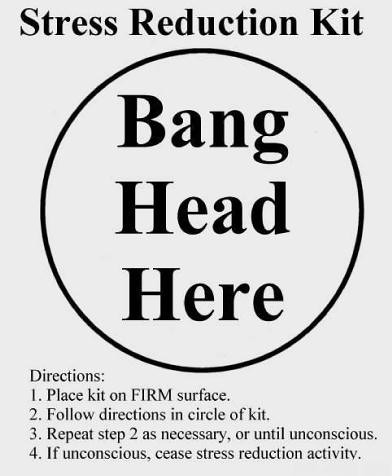
Facing a week with three prelims, a summary paper, and a class presentation? Then you are likely feeling a bit of stress.
Whereas once headbanging might have been the suggestion, now, thanks to the great world of YouTube, you are just a mouse click away from just the right stress reducer.
But be warned, these classics must be sipped slowly. Like fine wine, their sophistication means the taste may not emerge until the second or third glass from the same bottle.
A Silly Walk
The Monty Python crew was known for its clean mix of physical and intellectual comedy. One of the best is the sketch devoted to the Ministry of Silly Walks. If you have an upcoming important exam, take the few minutes to watch this gem. We even recommend you try one of these gaits as you walk to the test site so as to lighten the stressors. Of course, you really should find a partner to carry on the step, otherwise all the attention you draw might just be too much to bear.
Lumberjack Song
I’m a lumberjack and I’m OK also befits the crossdressing focus of Python. It is a catchy tune and the lyrics sung boisterously can certainly reduce anxiety. Of course, the beauty here is the creation of your own set of lyrics set to the tune, lyrics than you can return to time and again whenever it is time to calm those nerve ends.
Soccer Match
In one of the most brilliant of pieces, the Pythoners created this gem featuring the Germans and the Greeks. Using a taste of the old Steve Allen series where the writer would interview some historical figure in a talk show setting, this crafty video begs the question, who would be better at center-half, Aristotle or Socrates? Using a similar concept to help you remember any historical figures can make the mundane fun. We just prefer placing the subjects on the American football field where the thought becomes who plays quarterback and who in turn plays middle linebacker?
Argument Clinic
Of course, no Python review would be complete without visiting the Argument Clinic, with a quick early stop at Abuse. Here again a partner is critical. Either memorize the bit or simply wing it, just take ten minutes right before those exams are passed out to have an argument with your buddy. Score additional points if you can get beyond simple contradiction. We guarantee you will feel the butterflies emerging with every exchange.
Flickr photo courtesy of programwitch.
In today’s tough economic times, state universities are receiving a more thorough look from students who are searching for a quality program at an affordable price.
If you are one of the individuals looking at this option, one concern could be the sheer physical size of the school and the equally large numbers of students on state campuses. However, even if you are thinking of a small liberal arts college option, you might be surprised to learn that such focused study is likely available at your state university in the form of an Honors College.
James Madison Honors College
Featuring numerous study abroad programs and dual major options, James Madison Honors College first year students follow a common curriculum including two Madison courses: a year-long Writing course and a yearlong introductory course on Public Affairs. Under the auspices of Michigan State University, Madison offers students courses with as few as eight students and major options such as International Relations, Political Theory and Constitutional Democracy, Social Relations, and Comparative Cultures and Politics.
 However, students attending James Madison utilize the same admissions procedures and pay the same costs as students attending Michigan State University. Still the school has featured a number of Rhodes, Marshall, Truman and Fulbright Scholars and graduates seeking a higher degree at such prestigious institutions as Harvard, Yale, the University of Chicago, Stanford, Georgetown, Cornell, Columbia, Duke, and the London School of Economics.
However, students attending James Madison utilize the same admissions procedures and pay the same costs as students attending Michigan State University. Still the school has featured a number of Rhodes, Marshall, Truman and Fulbright Scholars and graduates seeking a higher degree at such prestigious institutions as Harvard, Yale, the University of Chicago, Stanford, Georgetown, Cornell, Columbia, Duke, and the London School of Economics.
Lauren E. Youngdahl, a 2004 graduate of the James Madison Honors College, indicates that the choice of JM represented a chance to experience the best college atmosphere possible.
“The appeal of James Madison was it was a ‘small’ college within a ‘big’ university,” explains Youngdahl. “So I could have, in my opinion, the best of both worlds.”
Her desire for a strong liberal arts background, one that focused on analytical thinking and writing was a key factor in her selection of James Madison.
From the small class sizes to the highly esteemed faculty members who are experts in their fields (no TA’s), the program delivered. She also noted the impact of high expectations of the professors regarding student work. Adding to the challenges were highly-motivated classmates, individuals who also pushed the work standards.
“I quickly learned there was no ‘skating’ by,” states Youngdahl. “And hard work was given a new definition.”
For her studies, Youngdahl was able to pursue several interests.
“I had interest in the International Relations major,” she explains. “I paired that with a Marketing degree from the Eli Broad Business School, something that was not available in any other program at MSU.”
Two other critical components of the program, the field experience and senior thesis also were key for the graduate.
“I played golf at MSU, so the best way to accommodate both my academics and athletics was to work as the Assistant Tournament Director for the Golf Association of Michigan,” states Youngdahl of her field experience. “I would say a majority of my classmates did internships with legislators, attorneys, etc. – which many of them then became.”
 “And, my senior year I had a class that was dedicated solely to writing a thesis. The subject was on the evolution of Asia as a world leader; and I did my paper on the Japanese automakers and their rise to success in the United States.”
“And, my senior year I had a class that was dedicated solely to writing a thesis. The subject was on the evolution of Asia as a world leader; and I did my paper on the Japanese automakers and their rise to success in the United States.”
The Honors College at the University of Maine
The Honors Program at the University of Maine is one of the oldest in the United States, having begun in the early 1930s within the College of Arts and Sciences. At that time, there were believed to be no more than a half a dozen such programs for undergraduates in the country.
Becoming a full-fledged college in 2002, The Honors College at the University of Maine is home to approximately 650 students. As with James Madison, its smallness is demonstrated by a fundamental commitment to investigate diverse academic areas and challenge students in a supportive intellectual environment, using a process that seeks always to engage fellow students and enthusiastic, distinguished faculty in thoughtful, provocative discussions.
The program features first- and second-year preceptorials, third-year tutorials, and like Madison culminates with a thesis. Its students also demonstrate a lengthy track record of success, being named Cooke Fellows along with Goldwater, Udall, and Smith Scholars.
Rachel Groenhout, now a graduate student in the Netherlands offers similar thoughts regarding her Honors College experience at the University of Maine in Orono right down to the reading and writing focus.
“I was invited to the Honors College at my University in the summer before freshman year,” explains the 2004 graduate. “I decided to give it a try because I would be able to take Honors Courses that would satisfy general education requirements that might otherwise be done through College English, Psychology, etc.
“The special Honors Sections featured a small class size (about 15 students) and a more active student experience: reading, discussing in class and weekly or monthly papers,” she adds. “This appealed to me far more than attending class in a lecture hall and only studying for a midterm and a final exam without doing anything in between.”
Similar expectations at Maine also had students completing some type of thesis senior year to earn their honors degree. The French major presented her research by authoring the work in that language.
“This was unquestionably the formative experience of my undergraduate career. For students going on to grad school, completing a first thesis with the supervision and the support of the Honors College staff is the ultimate preparation for more autonomous research work in graduate school.”
However, Groenhout insists those students with no initial interest in graduate study will also receive enormous benefit from the experiences.
“For those who don’t go on to graduate school, you’ll still have the satisfaction of having once written an academic publication. My master thesis is underway at the moment…and will probably be better than my Honors thesis…but I think no other thesis or dissertation will ever capture my heart and soul the way that the first one did.”
Groenhout offers one other caveat that students may well want to consider.
“In a time when more and more people are graduating from college, and grades are notoriously inflated, having completed an Honors degree gives your transcript and resume a little something extra,” she notes. “Whether you do it for personal satisfaction or to remain competitive on the job market, Honors is a win-win opportunity.”
The Economic Factor
 Professor Charlie Slavin, the Dean of the Maine Honors College, indicates that interest is up in the college. However, he is not certain that all of the increase comes because of the fiscal issues facing students currently.
Professor Charlie Slavin, the Dean of the Maine Honors College, indicates that interest is up in the college. However, he is not certain that all of the increase comes because of the fiscal issues facing students currently.
“As for now, it’s hard to say,” states Slavin. “We seem to have had a great deal of interest over the past year in the Honors College, but, again, there might be many reasons. We’ll probably know soon whether the current financial crisis causes precipitous changes in demand for or interest in the College.”
Still, there is little doubt that the Honors option is seen as a quality program that also carries with it great affordability. That concept is especially important to students who desire to continue on to graduate school.
“We always have anecdotal stories of students,” continues Slavin, “of those who enter with an eye already on professional schools (law, medicine). They want to be able to finish their undergraduate experience (more or less) debt-free while still having the credentials to compete well for graduate school acceptances. They know they will incur debt during that training.”
And as for why the experience of Honors College is so meaningful to so many students, Slavin offers his assessment.
“Our Honors Curriculum includes a major interdisciplinary core component that requires all of our students, regardless of their majors, to take intellectual risks,” states Slavin. “They are engaged in challenging academic inquiry outside their disciplines. I often refer to our engineers reading Plato and our artists studying the philosophy of quantum mechanics. This is the key to the honors concept.”
Honors Worthy of Consideration
In a Time magazine article from 2006, writer Nathan Thornburgh offered an assessment and rationale for considering state university honors colleges.
First, it may well be harder than ever to get into an Ivy League, but in presenting his eight strategies for kids and parents to use to find happiness beyond the ranks of the traditional elite schools, Thornburgh offers:
“Take the Honors Route – Big state schools trying to attract top students are increasingly establishing honors colleges. These schools within schools often feel like cloistered liberal-arts colleges but still have access to the superior resources of a large research university.”
For those who also love the athletic environment that a school can provide, Thornburgh adds:
“Another upside is that while you’re getting a more personalized education, you still have the chance to watch your school win a football game every once in a while.”
Slavin offers a similar assessment.
“It’s common in honors education to talk about ‘liberal arts college experience at a large university.’ I’m always a bit hesitant.
“It’s not the same, nor should it be,” insists Slavin. “Yes, there are some similarities: small classes, integrated curricula, closer personal attention. However, the real strength of our Honors College is the integration of those things with the cutting-edge research, and opportunities for students to be involved in this research, which takes place all across a major research University.”
Setting a New Trend
Cost-conscious students may want to think about bucking the elite trend, perhaps beginning a new pathway that represents a discerning consumer with a bent for both quality and value.
However, those who do so will definitely be in the minority at least for now.
“Our society still values name,” notes Slavin, a Princeton grad. “Regardless of education or credentials, there is an advantage to having a diploma with a certain name.”
Slavin notes the slow process of change.
“This is changing, more and more students from public institutions are winning major national fellowships (Rhodes, Truman, Goldwater, etc.) and getting acceptances to the most elite professional and graduate schools. But it’s hard to change people’s biases.”
Hard maybe, until you talk to students like Youngdahl and Groenhout. Listening to them, state university Honors Colleges appear to offer everything a student could want.
And most important for the cost-conscious student, they do so at a more affordable price.
Every spring, another group of college seniors, ready to set off on the quest for permanent employment, begins the process of creating that all important document, their resume. Working with campus career offices, students begin to polish up what turns out to be one of the most critical components of the job search process.
The Importance of the Resume
Lindsey Pollak, a Gen Y career and workplace expert, notes that resumes will always play a prominent role in the hiring process. First, such documents serve a very clear purpose.
“Having one relatively standard resume format allows recruiters to compare apples to apples,” states Pollak. The career advice blogger also notes the importance of a specific or traditional format.
“I’m a big fan of the one-page resume because it requires job seekers to be clear and concise in selling themselves. It’s just not realistic for people to submit huge notebooks of information or 20-page bios when applying for jobs.”
Greening of Society
 Though resume creation will remain a right of passage for the foreseeable future, technology has begun rendering the long-standing traditional paper format less and less important. Pollak sees the traditional format as potentially giving way to its digital equivalent over the next ten years.
Though resume creation will remain a right of passage for the foreseeable future, technology has begun rendering the long-standing traditional paper format less and less important. Pollak sees the traditional format as potentially giving way to its digital equivalent over the next ten years.
Part of the reason is the current concerns of global warming and a renewed emphasis on the environment.
“One reason I think resumes may become obsolete is because of the amount of paper it wastes,” states Pollak. “We are moving toward an all-digital society, so it makes sense that fancy-paper resumes will go the way of the cassette tape.”
However, the author of Getting from College to Career: 90 Things to Do Before You Join the Real World sees the current social networking interests of students also being a key catalyst. The popularity of such networking has led more and more potential workers to pursue jobs through this environment.
Need for a Primary Format
However, the ‘apples to apples’ comparison aspect means that employers will likely want an agreed-upon format, one that will allow them to make distinctions between candidates. The need for one primary model has employers looking at the most popular and useful site created to date, LinkedIn.
“Already, recruiters are using LinkedIn to source talent,” states the frequent on-campus speaker. “It’s professional, but allows people more room to describe their accomplishments, post links to their work, demonstrate the depth of their professional network (very important for a sales position, for example) and include recommendations from past employers and colleagues.”
In other words, the site allows workers to collect meaningful info in one place, helping them become more than an SAT score or GPA.

Pollak, has shared her views on electronic resumes on her own blog site. Online formats will “allow job seekers to demonstrate their writing skills, the depth of their professional network, links to relevant work online, recommendations from employers and peers.”
While noting that LinkedIn leads the way, time could well change that as well.
“Employers seem to be happy with LinkedIn, and that site has certainly become the leader in the professional networking field,” states Pollak. “Of course in the future other sites might come along.”
Indeed, others are emerging, sites like Emurse.com and VisualCV.com. In the case of Emurse, you can create, share and store your resume online for free. Once created you can then share it with potential employers. VisualCV.com lets you share different versions of your resume with various employees, coworkers, and friends. VisualCV also allows a person to include video samples of their best work.
New Recruitment Process Emerging
The premise of online resumes could well change the job recruitment process entirely. Instead of employers posting an opening on a job board, their human resource office personnel will likely be scouring the web for potential workers that they might like to invite in for an interview.
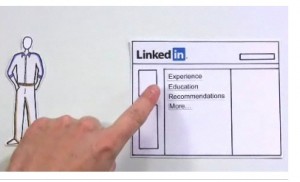 Pollak indicates that option is happening already.
Pollak indicates that option is happening already.
“Headhunters and recruiters are well aware of many candidates and they scour LinkedIn, Facebook, Twitter, Google and other places all the time,” she notes. “My own husband got recruited for his last job on LinkedIn!”
What makes the online resume environment even more enticing is the way that job matches are occurring.
“Right now, job matches are happening in a wide variety of ways, so savvy job seekers should pursue them all,” adds Pollak. “There is never a ‘guaranteed’ way to find a job, but I think we are very fortunate that right now there are so many potential places to look.”
Career Office
So seniors, as you head down to the campus career office this spring for the annual rite of passage, be sure to ask about LinkedIn and other possible social networking sites affiliated with your college. Today’s resume construction process means far more than developing a one page document on some fancy paper.
According to Pollak, it also means “reaching out to companies and recruiters, using headhunters, talking to people on airplanes, etc.”
And in today’s technology-oriented world, it also means “building a presence on social networks.”
Students looking for additional test prep practice options can now turn to two additional venues, a video game from the Princeton Review and a free online site called VerbaLearn.
Another SAT Prep Game Option
Joining Kaplan’s FutureU on the video game market is Princeton Review’s My SAT Coach. As with the Kaplan version from Aspyr Media, the Princeton version seeks to bring SAT preparation to the video game market.
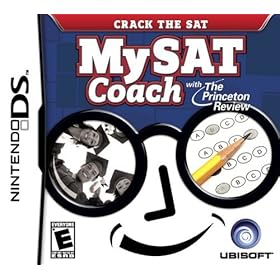 The Princeton option features the gaming folks at Ubisoft. Designed to be an enjoyable way for test preparation, the game seeks to help students learn the key skills for tackling all of the different subsections of the SAT test. The game also provides feedback so students can see the overall progress they have made through game play.
The Princeton option features the gaming folks at Ubisoft. Designed to be an enjoyable way for test preparation, the game seeks to help students learn the key skills for tackling all of the different subsections of the SAT test. The game also provides feedback so students can see the overall progress they have made through game play.
The Princeton game also seeks to involve students in “a series of mini-games that will help you increase your level of judgment, confidence and time management. Learn about helpful methods and mental approaches to reduce stress and ensure you are physically and mentally prepared.”
Unfortunately, we could not find any reviews confirming the enjoyability aspect of the game. But with every piece of data indicating that practicing for the exam does in fact lead to better scores, you may want to give the game a go.
The new game from Ubisoft offers timed testing options but unlike FutureU which is also available for download to a PC or Mac computer, My SAT Coach is available only for Ninetendo DS (cost, $29.99).
A General Vocabulary Builder
Going one step better, at least in vocabulary preparation, is the new site VerbaLearn. Instead of focusing on SAT prep, this site is designed for “polishing your lexicon” and would be helpful in preparing for any of the nationally normed tests, the SAT, ACT, and/or GRE.
Most importantly, the game is free, meaning there is no reason not to give it a try.
The online site offers you the ability to customize your vocabulary list and customize MP3 options that feature the words on your list. That means that though the site is based online, you have the option to download podcasts to iTunes or any application of choice, and take them with you to review while on the subway or bus.
The site features a simple demonstration video that explains the basic workings of the site and a suggested feature called VerbaLearn2Earn to help create additional incentives for the vocabulary building process.
One of the most expensive and at times frustrating aspect of the college scene is the biannual semester book purchase. Long lines and big outlays for books that you are afraid to go without yet may use very little make the process a very negative one for students.
If you find the process more than you can stand or the cost prohibitive, then you may want to take a peek at a new concept and a new site, Chegg.com.
Lease, Instead of Purchase
 Leasing textbooks is exactly as it seems: college students may rent as many hardcopy textbooks as they might need for the upcoming semester or year. By renting books instead of purchasing, students immediately reduce the overall cost burden of this aspect of their education. In some cases, the savings can be as much as 80%, especially if a text is brand new.
Leasing textbooks is exactly as it seems: college students may rent as many hardcopy textbooks as they might need for the upcoming semester or year. By renting books instead of purchasing, students immediately reduce the overall cost burden of this aspect of their education. In some cases, the savings can be as much as 80%, especially if a text is brand new.
Students may also select the needed books online from their own computer and then have them delivered directly to their dorm room or apartment. No waiting in long lines just for the chance to spend gobs of money.
Chegg.com
A Santa Clara, California-based company, Chegg.com is one such marketplace for renting textbooks online. The concept is considered so forward-thinking that the company recently raised $25 million in investment funding from a number of high profile venture-capitalists.
The additional financing will enable the company to pursue an aggressive growth strategy. With the funds, the site will be able to provide enhanced services including the expansion of its textbook rental catalog.
Adding to the Chegg process, students may also purchase texts from the online site. Students will also know at the time of purchase what they can expect for a possible cash return should they decide they do not want to keep the text.
Support for the Environment
The company, founded in 2005, understands the concept is a green issue as well. Clearly, over time the number of books being produced and wasting away on shelves will be reduced saving countless resources.
At the same time, to reinforce an environmental message, Chegg plants one tree for every textbook rented. Since getting the textbook leasing option underway, the company has planted over 150 city blocks worth of trees.
Decision Time
There could well be books that students do want to purchase as they could be potential future resources while on the job. Texts in courses related to one’s major may not be ripe for the leasing process.
However, the ability to both purchase or lease online means that Chegg is a site students should definitely consider. While the influx of capital should greatly enhance their library of text offerings, Chegg currently offers over 1 million books to choose from.
Students looking for a better process and cost savings may want to pay Chegg.com a visit prior to making their spring semester book purchases.
Flickr photo courtesy of wohnai.
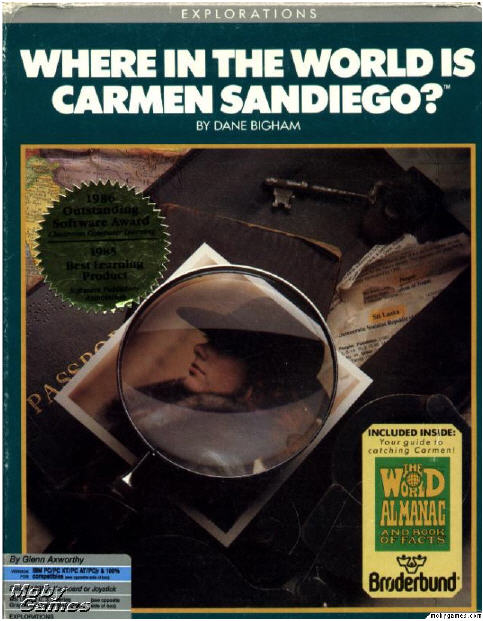
A name that should be familiar to almost anyone that’s picked up a game in the last 20 years, the Carmen Sandiego series lived long and prospered between the years 1985 and 2001, seeing multiple releases on most platforms that were around at the time. Kick-started by Brøderbund Software in 1985, the series was essentially a way to make the subject of Geography appear “hip and cool” to “the kids” by offering it up as a game, rather than something you learnt at school. Educational content was a staple of the series as you followed the trail of superthief Carmen Sandiego and her band of V.I.L.E (Villains’ International League of Evil) henchmen, with each new game in the series expanding the search across the globe and eventually including travelling through time as a viable option of pursuit.
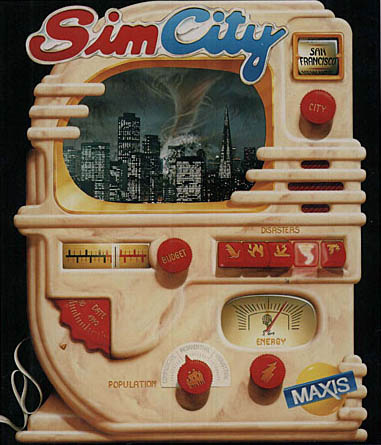
The beloved “city simulator” which has consumed more man-hours than sleep first started in 1989 and was made by Maxis and legendary game designer Will Wright . The premise behind the game (and every subsequent Sim City game) was to…Er…Simulate a city. More accurately, you assigned various zones (residential, industrial, commercial and the like) in which citizens would build related services and/or buildings. Eventually, after laying down water pipes, roads and power lines, you’d control the city in more indirect ways like managing the economy, politics, police and emergency services. This was the game to teach an entire generation or two that it wasn’t the “winning” that counts, but more the building an epic sprawling metropolis, only to destroy it by unleashing Godzilla upon it whilst laughing maniacally.
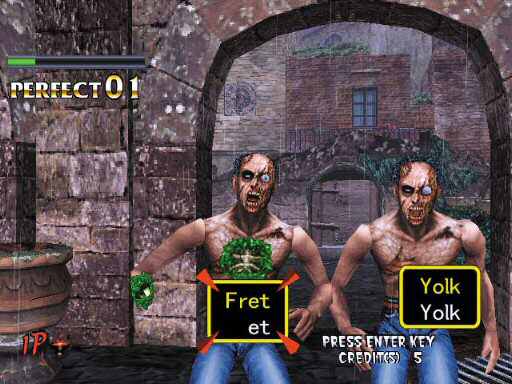
Everyone and – quite possibly – their mother has heard of Mavis Beacon Teaches Typing, but have you heard of The Typing of the Dead? You might have, but it makes for a dramatic opening paragraph. Just in case you haven’t heard of it, it follows in the same educational vein as Mavis Beacon did, with the ultimate aim being to enhance your typing skills. Except with zombies. There’s an age-old saying that if you add zombies to something, it’ll make it infinitely better. Except oatmeal, I don’t imagine anything making that better. This genius of a game took the original House of the Dead 2 game and transposed the Mavis Beacon typing format over it, so in order to defeat the oncoming zombie hordes, the player had to type words that appeared on the screen, with each letter being a gunshot. Finishing a sentence was never quite so satisfying.

Solitaire was originally packaged with the Windows 3.0 (in 1990) operating system as a standard item, the aim of which was to ease users into getting to grips with the mouse-based control system, as up until then, the primary way to navigate was via a mixture of the DOS interface and keyboard shortcut commands. Suddenly people everywhere were getting used to basic mouse functions like drag-and-drop, double clicking and generally just moving the mouse about after a lifetime of near-total keyboard usage. Naturally this led to many problems in the workplace, as more and more people became hooked on the game, decreasing their work output exponentially and occasionally leading to firings. The same could be said of Minesweeper, with its number-based, spatial-awareness-promoting, speed-run-inducing simplicity.
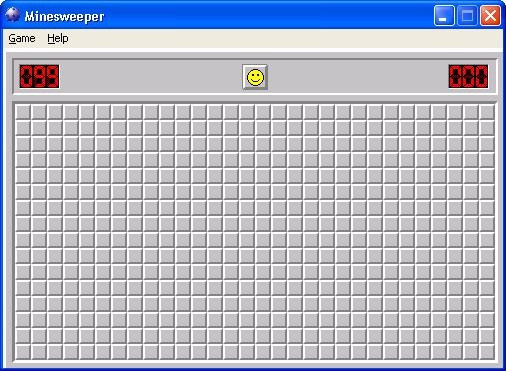

Perhaps arguably the best chess game ever, Battle Chess managed to turn a game as uneventful and boring (for then children and quite possibly anyone not really into chess these days) into an engaging and often exciting experience. Exactly as it sounds, it was normal chess…With battles. Both the sound and the pseudo-3D effects that were used were rather impressive for the time (1988, developed/published by Interplay). But more importantly, it made chess awesome (Or even more awesome, depending on your view of the game)!
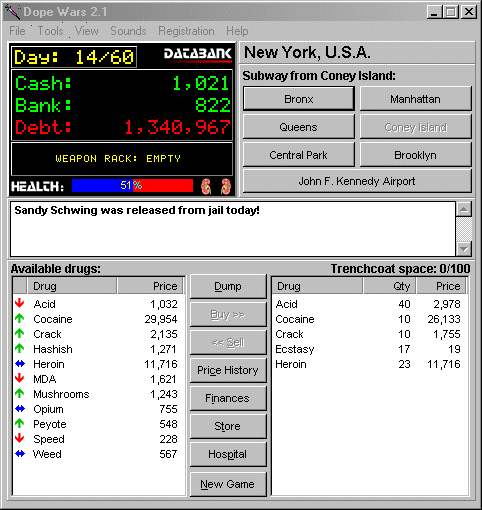
Whilst the subject matter might not have been the most politically correct of the lot; it was nevertheless an addictive and popular game. The player assumed the role of a drug dealer trying to earn a living by doing what he/she knows best, namely dealing drugs to everyone, quite possibly also children (dealing drugs to children, not dealing in children). On the surface it was a simple game of “making loads of cash by being bad”, but subconsciously it taught valuable life-skills like budgetary management, being able to forecast a financial market, the importance of supply and demand and how much a kilo of crack costs in New York.
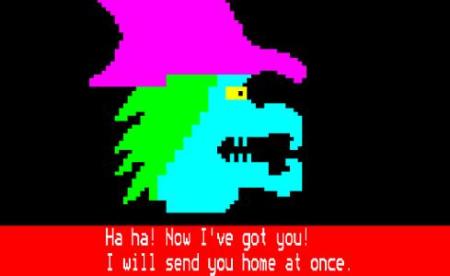
Billed as an “educational adventure game” and released in 1983 for the BBC Micro (it was also ported to such retro stalwarts as the Amstrad CPC, Commodore 64 and the ZX Spectrum), this game had you out on a quest to save the children of the King and Queen of the Kingdom of Mountains, whilst all the while avoiding some random evil witch whose motive for being evil was probably just because she felt like being really irritating at the time. Most of the puzzles involved were logic-based, others could be quite bizarre and random, but overall the game was a light-hearted puzzle-fest most notable for its awesome music.
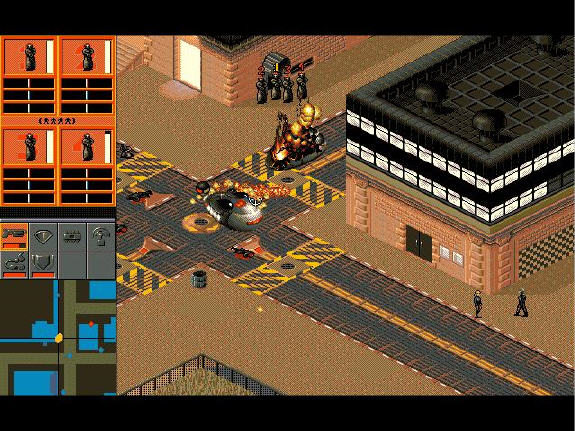
This was a fantastic SF strategy/action isometric game. Syndicate (which later became a series of games) was released in 1994 by those bastions of excellence, Bullfrog. It was set in a dystopian future in which corporations fought for dominance over the global population by using cyborg agents, which was pretty cool. The game saw you as an executive from a corporation in command of a team of cyborgs and your job was to carry out various missions on behalf of said corporation, by any means necessary, usually by killing and destroying everything in your path. The game had a distinct SF/Cyberpunk flavor, which many found to be appealing; along with the resource/research management aspect of the game, with regards to if you ran out of funding for your agents/equipment/tech research, you were in big trouble. It was also good for improving geography skills, as you strategically planned to dominate the entire globe, country by country.
A recent report card from the Josephson Institute paints current high school students in a very negative manner. Citing “entrenched habits of dishonesty” among young people, the survey of more than 30,000 high school students indicates that more students are lying, cheating, and stealing than ever before.
Ironically, we had a disillusioned student leave a comment on the site just after the report card was made public. Coming as a response to our article, The 11 Top Reasons Why Students Drop out of College, the writer not only revealed a significant level of discouragement, he offered a possible solution:
“I am Soooooooooo burned out of this entire experience!!! What would happen if I were to just say that I had the degree on my resume? Anyone ever tried that? How many employers actually check?”
Hopefully, it was a tongue-in-cheek response. But if it wasn’t……..
Honesty and Integrity
Whenever I hear someone propose such a solution, even when the option is thrown around in jest, I can’t help but turn to the very public and humiliating story of George O’Leary.
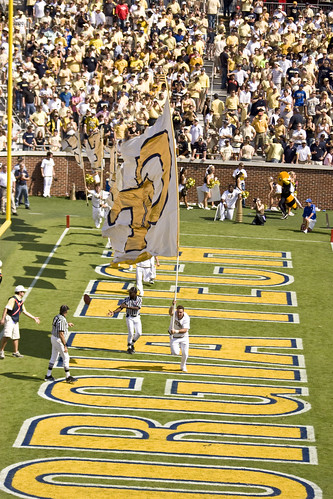 During a seven-year period, O’Leary resurrected a moribund Georgia Tech football program. Guiding the team to five winning seasons in his final six years, O’Leary was named the Atlantic Coast Conference ‘Coach of the Year’ award in both 1998 and 2000, and was also named the ‘Bobby Dodd National Coach of the Year’ in 2000.
During a seven-year period, O’Leary resurrected a moribund Georgia Tech football program. Guiding the team to five winning seasons in his final six years, O’Leary was named the Atlantic Coast Conference ‘Coach of the Year’ award in both 1998 and 2000, and was also named the ‘Bobby Dodd National Coach of the Year’ in 2000.
In 2001, the University of Notre Dame, a proud academic institution that routinely graduates more than 90% percent of its student body, selected George O’Leary to be its new head football coach. His appointment resonated with Notre Dame boosters and football fans everywhere.
His selection was seen as an apparent “pull oneself up by the boot straps” kind of story that epitomized the American work ethic. An insignificant football player at a small university, O’Leary had languished long and hard as an assistant football coach before his revival of the football program at Georgia Tech.
Called the perfect candidate by school officials (right down to his Irish name), this hard-working, outstanding leader of young men was deemed the perfect choice to restore storied Notre Dame football to its former golden days. Yet, what began as a true “feel good” story rapidly disintegrated into one of the saddest of public moments for both a coach and an institution that prided itself on integrity and accomplishment.
Reporters Begin Checking Resume
First, one reporter, seeking to find some interesting quotes from the University of New Hampshire regarding O’Leary’s collegiate playing days, made a call to former members of the coaching staff at the school. The reporter was surprised to learn that no one on the coaching staff remembered O’Leary.
Further research failed to find any school records that verified that O’Leary had ever played football for the tiny Division 1AA program. Confronted with this information, O’Leary acknowledged he had embellished his resume.
No, he was not a three-time letter winner at the school as his resume indicated. Injuries and health problems had kept him from receiving any playing time.
Provided with this insight, Notre Dame initially stood by its candidate. After all, O’Leary was reported to be a man of integrity and his tenure as coach at Georgia Tech coincided with the school’s reemergence as a national football power. Notre Dame, at the assurances of O’Leary, were told that his embellishment of his playing record was a singular blunder and that there was nothing else for the university to be concerned with.
A Graduate Degree?
However, the University was soon confronted with further fabrication.
O’Leary’s resume included his having earned a masters degree from NYU in 1972. That graduate degree was extremely important because to work at the collegiate level, even as a coach, one generally must have some form of higher degree.
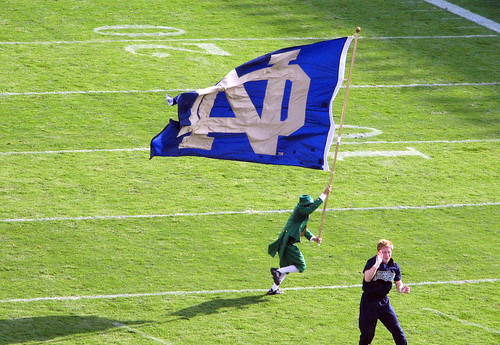 Yet, it seems that once again Notre Dame’s candidate had taken the liberty to embellish his achievements. Though NYU acknowledged O’Leary had been a student there, their records indicated that he had never earned a graduate degree.
Yet, it seems that once again Notre Dame’s candidate had taken the liberty to embellish his achievements. Though NYU acknowledged O’Leary had been a student there, their records indicated that he had never earned a graduate degree.
Amazingly, these fabrications had been part of O’Leary’s resume since 1980 when he had filled out an application for an assistant coach position at Syracuse University. These concoctions had never been truly scrutinized until his appointment as head coach at one of America’s most storied institutions.
A stunned national sports audience read with great chagrin of O’Leary’s foibles and their effects on his coaching career. Elders at the time noted that once again ethical shortcomings in one’s youth had come back to not only haunt, but perhaps in this case, even destroy a man’s career.
At the time, much of George O’Leary’s amazing fall from grace was seen as a snapshot of what is wrong with collegiate athletics. O’Leary saw it differently, blaming it on ‘resume padding.’
In submitting his resignation to Notre Dame, one he had been asked to submit, he acknowledged: “In seeking employment I prepared a resume that contained inaccuracies regarding my completion of course work for a master’s degree and also my level of participation in football at my alma mater. These misstatements were never stricken from my resume or biographical sketch in later years.”
A Lesson for All
Any student thinking of falsifying his or her academic record or resume would do well to give careful consideration to the story of George O’Leary. There are numerous lessons that can be learned from the situation, not the least of which involved many, many years of hard work all undone in a matter of days because of ethical transgressions committed at an early age.
 Ironically, at the time, employers did not initially check on O’Leary – the checks were actually done by reporters seeking not to confirm or undo, but to report on what was believed to be an interesting and worthy story.
Ironically, at the time, employers did not initially check on O’Leary – the checks were actually done by reporters seeking not to confirm or undo, but to report on what was believed to be an interesting and worthy story.
However, since that time, public institutions began putting fact-checking measures in place. After all, no employer wants to ever be exposed to the public level of embarrassment the University of Notre Dame was subsequently subjected to.
In response to the earlier comment from one of readers, “What would happen if I were to just say that I had the degree on my resume? Anyone ever tried that? How many employers actually check?”
The answer is yes at least one notable person has tried it. And the second answer is yes, many employers now check.
As to “What would happen if I were just say that I had the degree on my resume?” Well, this story clearly reveals that blatant falsifications can come back to haunt you at the most inopportune time imaginable.
Flickr photos courtesy of MDB 28, Glenn and Telethon.
It is likely that at every high school or college graduation ceremony, at some point in time, at least one of the speakers will insist that the secret to a life of fulfillment is to remain true to one’s dreams.
Yet, at the same time, it is also likely that a look towards the audience would reveal at least one adult with a cynical eye dismissing such blatant optimism in a most scornful manner.
Fortunately, however, there are still some students who not only listen to the speaker’s message of hope, they take it upon themselves to test the theory.
The Desire to Make a Difference
 When asked about her involvement in Division I athletics at a high-profile school, Parker Goyer could point to many key lessons from the world of sports: persistence, work ethic, setting goals, and overcoming setbacks. She also could point to the year-round commitment necessary to compete at such a high level and the subsequent time constraints that participation had on her ability to utilize these important skills while being of service to others.
When asked about her involvement in Division I athletics at a high-profile school, Parker Goyer could point to many key lessons from the world of sports: persistence, work ethic, setting goals, and overcoming setbacks. She also could point to the year-round commitment necessary to compete at such a high level and the subsequent time constraints that participation had on her ability to utilize these important skills while being of service to others.
But the year-round commitment to school and to athletics left Goyer little opportunity to travel abroad or to partake in community service. For the 2007 graduate of Duke University, the latter was a big issue.
Inspired by the likes of Wendy Kopp, the founder and CEO of Teach for America and Greg Mortenson, a one-time mountain climber who has dedicated his life to building schools in remote parts of Pakistan and Afghanistan, Goyer chafed at the lack of opportunities student-athletes had to be of service to others.
Recognizing that there had to be other collegians with similar sentiments, Goyer came up with a bold plan, one that would allow student-athletes to utilize their skills and talents to help serve young people in countries less-developed than her own.
Coach for College
 Now in her first year at the Harvard Graduate School of Education, Goyer conceived of the “Coach for College” program while visiting Vietnam and Belize the summer following her graduation. While visiting those countries, Goyer saw first hand an underdeveloped educational system and countless young people who simply did not have a cadre of role models to help lead them.
Now in her first year at the Harvard Graduate School of Education, Goyer conceived of the “Coach for College” program while visiting Vietnam and Belize the summer following her graduation. While visiting those countries, Goyer saw first hand an underdeveloped educational system and countless young people who simply did not have a cadre of role models to help lead them.
The former Duke tennis player saw an opportunity, a true win-win in the proverbial sense. If she could create a program that would allow American student athletes to put their athletic lessons to work in real life settings, the youngsters in some of the world’s poorer countries would not only have access to some key role models, those youngsters would have the chance to learn some valuable skills as well.
“A major guiding principle of the Coach for College program is that student-athletes have great traits they develop through sports,” explains Goyer. “But they don’t always apply these traits which they perfect on the playing field in other settings.”
“I wanted American student-athletes to realize that, by virtue of being highly-skilled sports players in some of the best higher education institutions in the world, they have tremendous power to make a difference.”
Program Launched in Summer of 2008
With a goal of utilizing sports to teach key life lessons, Goyer envisioned a group of college athletes giving up some of their summer time to help the youngsters in underdeveloped countries learn “critical thinking skills” and promote “excitement about academics.” While the need for funds was significant and the task of raising half-a-million dollars a daunting one, the 23-year-old never doubted the worthiness of her concept.
 “A lot of people were skeptical at first and thought that I was too young, that this was too big of an idea, and didn’t know if I could pull it off,” reveals Goyer. “I think I was able to succeed by setting concrete goals, identifying key supporters early on, and using their advice and support to make steady progress towards my goals, one step at a time.”
“A lot of people were skeptical at first and thought that I was too young, that this was too big of an idea, and didn’t know if I could pull it off,” reveals Goyer. “I think I was able to succeed by setting concrete goals, identifying key supporters early on, and using their advice and support to make steady progress towards my goals, one step at a time.”
Adding to her belief in the program concept itself, the idea of teaching life lessons through the world of sports, Goyer found herself drawing on the lessons she had taken from being a competitive athlete.
“Setting up the Coach for College program reinforced the value of sports in transmitting key life skills. I found myself drawing upon some of the same skills – persistence, work ethic, setting goals, overcoming setbacks, etc. — that I had used to make progress as a tennis player.”
Putting her organizational, goal-setting and perseverance skills to the test, Goyer secured more than $480,000 to fund the first two years of her concept. The monies came from two Atlantic Coast Conference rival colleges, Duke and the University of North Carolina, as well as the National Collegiate Athletics Association, the U.S. State Department, and a number of other individual and corporate donors.
With funding secured, this past summer student-athletes from both Duke and UNC made their way to rural Vietnam for the first ever “Coach for College” sessions. In addition, bilingual students from Can Tho University also led the training that involved the games of badminton, basketball, soccer, tennis, and volleyball.
 A key component of the program included the building of a five-in-one sports court, with lines for the sports that would be taught in the program. Constructed on the grounds of the middle school, local workers built it using money from the funds Goyer had raised. The permanent construction meant that the Vietnamese children could continue, during their school year, to play the sports they had been introduced to by the Coach for College program that summer.
A key component of the program included the building of a five-in-one sports court, with lines for the sports that would be taught in the program. Constructed on the grounds of the middle school, local workers built it using money from the funds Goyer had raised. The permanent construction meant that the Vietnamese children could continue, during their school year, to play the sports they had been introduced to by the Coach for College program that summer.
Working alongside their Vietnamese counterparts, the American student-athletes conducted two three-week units featuring a number of sports clinics and classroom lessons to 200 children ages 11-15. The group also managed to blend in Vietnamese high school students who benefited from the program but in turn served as next step role models for the younger children.
The basic lessons taught within the sports clinics were reinforced by academic offerings that featured the application of sports to Health/Biology, Physics, English, Leadership, and Education/Psychology. The program, free to interested children, provided a wealth of prizes/gifts based upon outcomes in team-based sports and academic competitions as well as each student’s completion of the various academic modules.
The Translatable Goals of Athletics
Wise beyond her years, Goyer created a program that offered lessons for both groups, the American students who accompanied her and the youngsters in Vietnam that participated in the clinics. Both groups saw first hand that teamwork, sacrifice, hard work, and determination often form the basis for success in many other settings.
 “The overarching idea is that skills like perseverance, determination, setting and achieving goals, and overcoming setbacks, all of which can be learned through sports, are the keys to success in education as well,” notes Goyer. But as for the lessons for her fellow athletes, the Coach for College founder was unequivocal as to what came first for her.
“The overarching idea is that skills like perseverance, determination, setting and achieving goals, and overcoming setbacks, all of which can be learned through sports, are the keys to success in education as well,” notes Goyer. But as for the lessons for her fellow athletes, the Coach for College founder was unequivocal as to what came first for her.
“Personally, my primary goal is to help the middle school youth, and I intended the benefits to the coaches, both the American student-athletes and Vietnamese college students, to come as a natural by-product of their participation in the program.”
Still, Goyer attempted to work on the highest plane imaginable. More than simply providing Vietnamese youngsters with a cadre of role models, Goyer sought to inspire these 11-15-year-olds to consider higher education. To further that notion, the Coach for College concluded every daily camp session with a 30 minute class on the topic.
Following One’s Dream
Perhaps most importantly, the goal-setting Duke graduate has established other possible plateaus for her concept. Her vision is to see the program “partner with professional athletes” as well as “sports-related companies such as Nike.”

In addition, Goyer is set to invite other “universities which are athletic rivals to sponsor Coach for College programs at new sites.” The plan includes “utilizing the existing conference structure present in intercollegiate athletics” with the idea that each conference could perhaps sponsor a program in one particular region of the globe.
Once upon a time, Division I student-athletes may have had little to no chance to travel abroad or engage in meaningful service to others. But thanks to one young woman with a vision and a thorough understanding of the lessons that athletics can offer, student-athletes with a service mind set now have a concrete model to follow.
Editor’s Note: On Saturday, November 22nd, Parker Goyer was one of 32 Americans selected for a Rhodes Scholarship. Valued at $50,000 per year of study, the scholarship will enable the Coach for College (CfC) founder to study comparative international education at Oxford. Her hope is to learn more about the different education systems, academic curricula, and personnel of different countries to determine which ones will provide the best fit for the CfC program moving forward.
Ironically, most students who seek campus employment do so because of the desire to help fund their education. Yet, talking with two student bloggers, Amelia Possanza (2012) of Swarthmore College, and Yuri Ozeki (2009) from the University of Illinois, working on campus is an integral part of their overall college experience.
On Campus Employment
Amelia Possanza, a freshman at Swarthmore College, found the perfect work opportunity for her at the school’s performing arts center. Having done a great deal of technical theater work for fun in high school, Possanza utilized her prior experiences to secure a regular position at Swarthmore as a scene shop foreman.
The native of Pittsburgh has kept her hours to a minimum in the early going, especially given her involvement in athletics as a member of the swim team. In her first semester, Possanza does two shifts of two hours each week.
As for budgeting her time, Possanza learned in high school that doing school work for hours on end never really got her anywhere. “What works for me,” explains Possanza, “is studying for awhile and then doing some physical activity that allows my mind to mull over the concepts and sub-consciously work stuff out.”

The freshman minoring in Latin American Studies loves the physical nature of working and building sets. “Cutting wood and putting in screws gives me an opportunity to do something with my hands and take a break from mental exertion.”
Possanza also is quick to point out that she has learned a great deal from her work experiences, teachings that she might not otherwise receive in the classroom.
“Technical theater is all about problem solving, especially problem solving for problems that no one has ever encountered before,” she notes. “How can we make this plastic well look real? What can we attach to this metal bar to make it longer?”
“I love it because there is no right answer, only a method to approaching such problems.” As for gaining additional skills, Possanza adds, “I’m obtaining practical skills, such as saw use and drafting, that could help me get a transitional job in the future.”
Yuri Ozeki of the University of Illinois manages to hold down three on-campus jobs simultaneously. The senior works anywhere from 25-30 hours a week with a chunk of that time coming on weekends.
The bulk of Ozeki’s work hours come as a facility manager at the Urbana-Champaign’s Division of Campus Recreation. Her two older sisters worked at the facility when they attended Illinois and encouraged their younger sibling to consider it as well.
My campus recreation job is very flexible,” states the 22-year-old. “I work with other facility managers to create a work schedule that we are all happy with. Typically, I have two morning shifts during the work week, then, I try to pick up two weekend shifts.”
In addition to the 10 or 12 hours she spends each week at her campus recreation employment, the News-editorial journalism major puts in time as a writing intern at the University’s Office of Admissions. Though she has a relatively routine schedule, working four hours each Monday, Wednesday, and Friday, she acknowledges that the office has been very willing to recognize how important her education is to her.
“Some weeks, I have two or three class projects due,” the senior notes, “so I won’t work as much but then the next week, I’ll try to be in for longer shifts three times a week.”
To further her writing skills, Ozeki also took a copy-editing position at the campus newspaper, The Daily Illini. As a freshman, she also served as a reporter for the paper. “I work once a week and attend occasional meetings and training sessions,” she explains.
But while school is definitely her primary responsibility, Ozeki, like Possanza, insists that her work experience is rounding out her college education very nicely.
“My various jobs are really contributing to my education just as my classroom work is, so I see it as time well spent. When I’m working, I don’t necessary see it as ‘working’ or see it as something removed from my purpose of being in college: my education.”
Additional Peer Group
In addition to the overall work experience, each setting provides students another set of individuals to become acquainted with. Possanza acknowledges that her work in the theater does not bring her in contact with many classmates.
“I don’t work with many other students,” explains the Swarthmore freshman. “But the full-time technical theater crew that I work with is full of fairly young people who constantly teach me about new music. They also had very different college experiences than I did.”
“I have also met a few part-time people who are trying to start a career in technical theater, so they take on whatever jobs they can get. It’s so interesting to talk to people who are out in the ‘real world,’ especially since college can be such a bubble.”
For Ozeki, her work at the Daily Illini brings her into contact with fellow journalism majors. She notes, “It’s important to have a support network of people who are going through the same experiences.”
But she also quickly adds that her work at the Office of Admissions and Campus Recreation brings her into contact with people from many different fields. “Working with people who have different perspectives and ideas only help me to widen my skill sets and viewpoints,” she insists.
“At Campus Recreation, there is just a plethora of student employees. I really enjoy working there because it’s just a hub where a great variety of people are able to come together to accomplish the same goal. And our patrons and members are fellow students from every major and minor imaginable.”
Balancing Responsibilities
When it comes to balancing the responsibilities of school and work, both young ladies are clear that work actually helps them handle this task. Both also have schedules that would likely wear down the typical student.
 Possanza of course also has to budget extensive time for swim. “The swim season officially started at the end of September and runs until the end of February,” states the 18-year-old. “We have practice everyday, except Sundays, for two hours. Meets can take longer, especially if they’re away.”
Possanza of course also has to budget extensive time for swim. “The swim season officially started at the end of September and runs until the end of February,” states the 18-year-old. “We have practice everyday, except Sundays, for two hours. Meets can take longer, especially if they’re away.”
However, the freshman insists her schedule as constructed is very manageable.
“This semester the balance doesn’t seem too difficult because all first semester freshmen at Swarthmore are pass/fail,” adds Possanza. “But in the future I expect that this job will help with the balance.”
Ozeki acknowledges her preponderance of work time might be more than a bit unusual.
“I really just like working,” she says. “I keep piling on new jobs because I just enjoy new environments and working with new people. It sounds weird, but it’s true.”
Still she recognizes the need for budgeting her time accordingly.
“It can be difficult to manage study and work time, but it all comes down to prioritizing your responsibilities,” states Ozeki. “I’ve been fortunate enough to have very understanding employers and co-workers that know that some weeks are worse than others in terms of my work load.”
Getting the Most from College
Many students regard college as a full time commitment. Yet when pressed, those same students acknowledge that there is always time for other activities over the course of each week.
The question always comes down to what we do with those hours. Certainly, spending time socializing with peers is one of the preferred activities, both for its pure enjoyment as well as for taking one’s mind off the stresses associated with papers, prelims, and projects.
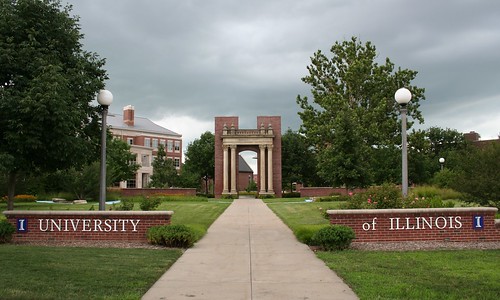 Yet, as Possanza and Ozeki point out, spending a few hours a week working can also provide a great break from the study routine. In addition, that work can provide a wealth of additional learning opportunities as well as an interesting set of new acquaintances.
Yet, as Possanza and Ozeki point out, spending a few hours a week working can also provide a great break from the study routine. In addition, that work can provide a wealth of additional learning opportunities as well as an interesting set of new acquaintances.
Given the costs of a college education, students should want to maximize their experience. Working in one of the many on-campus settings is one way to ensure that you get the most you can from your college years.
Flickr photos courtesy of Colin Purrington and almostincognito.
There is little doubt today that internships are a critical aspect of a college student’s preparation for future work opportunities. Not only do internships create a network of future employment options, a well-chosen opportunity will help you apply your knowledge and skills in a real work environment.
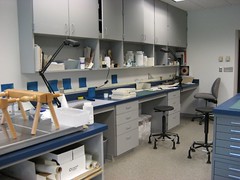 Most often, an internship is considered a trade-off, a swap of your time versus the chance to earn some serious cash. However, in today’s troubled economy, many students are finding that not only have the job opportunities dried up but internships are also exceedingly hard to come by as well.
Most often, an internship is considered a trade-off, a swap of your time versus the chance to earn some serious cash. However, in today’s troubled economy, many students are finding that not only have the job opportunities dried up but internships are also exceedingly hard to come by as well.
In tough economic times, you just might need to create your own prospects. Here are six steps to help you secure such an opportunity.
1. Talk to Your Professors: The first step is to let your professors and your advisor know you are looking for an internship. Simply stated, these folks have connections to a multitude of professional people. Not only might they know of a possible option, if these individuals know you well enough they might even lobby a colleague on your behalf. And there is always the chance they themselves might take an intern to help with a specific project or some research. But they cannot help you if they are not aware you are looking for an internship.
2. Talk to Your Parents and Extended Family: Ditto number one. Any working member of the family could have similar connections. More importantly, they could be your strongest lobbying agent for a position. Be aggressive and follow up on all possible leads.
3. Attend a Career Fair:  Take the time to attend a career fair to research companies that you would enjoy working for even if they are not hiring. Talk to the key people and introduce yourself, then get their card. Later, construct a letter of interest to the person you met that first indicates how impressed you were with the company followed up with indications that you would welcome an internship opportunity should anything become available.
Take the time to attend a career fair to research companies that you would enjoy working for even if they are not hiring. Talk to the key people and introduce yourself, then get their card. Later, construct a letter of interest to the person you met that first indicates how impressed you were with the company followed up with indications that you would welcome an internship opportunity should anything become available.
4. Consider Community Service: Yet another option is to examine those entities looking strictly for volunteers for some form of community service. Here again, think through the options so that you find a non-profit that would also offer you the chance to use your skills to help perform some additional meaningful opportunities. One student we know volunteered at a food bank. While the majority of the time was spent stocking shelves and doing inventories and paperwork, she was given the chance to use her technology skills to help set up a system to automate some of these tasks. While much of her time at first was unpaid, as time progressed the agency began to pay her for the hours she spent automating the agency’s record keeping.
5. Have a Polished Packet Ready: If you are going to pursue your own option, you must plan ahead and be fully prepared to submit a packet at a moment’s notice. Have your resume up to date and polished – use the campus career center to help you put together a quality product. In addition, have a roughed out cover letter that hits the basics about you but leaves room for you to tailor the letter to the company or person you are applying to. Resist using the same cover letter over and over again – to give the impression that you are totally interested in an opportunity with that company the letter must be unique to that business.
6. Do Mock Interviews:  Lastly, make an appointment at the career office at your school to conduct a mock interview. Try to get written feedback and go back to the dorm to rehearse further before doing yet another mock up. Try to get the second one taped if you can and again solicit written feedback to help you hone your skills. The bottom line, if there are four people interviewing for a possible internship, the one that makes the best impression will likely get the opportunity. A skilled performance can even overcome an average GPA.
Lastly, make an appointment at the career office at your school to conduct a mock interview. Try to get written feedback and go back to the dorm to rehearse further before doing yet another mock up. Try to get the second one taped if you can and again solicit written feedback to help you hone your skills. The bottom line, if there are four people interviewing for a possible internship, the one that makes the best impression will likely get the opportunity. A skilled performance can even overcome an average GPA.
Ultimately, in these tough economic times, be aggressive and prepared so as to seize the right opportunity when it presents itself.